When I meet with clients who are interested in having me guide them through a home renovation, I generally let them tell me every idea they have for the new space. This is a helpful exercise as I like for clients to get all the ideas out there so they feel we left no stone unturned. Then, from all of those ideas I narrow our focus to the ones that have to be done. The reason for this is that most people have a budget and simply can’t afford to do EVERY idea that they have pinned on their Pinterest boards. So, by honing all of their ideas into the necessities that they will need give us parameters to keep from busting the budget.
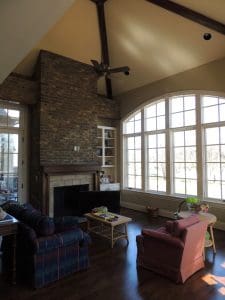
BEFORE this Keeping Room had great features, it just needed fresh paint, a new light fixture, and DECORATING.
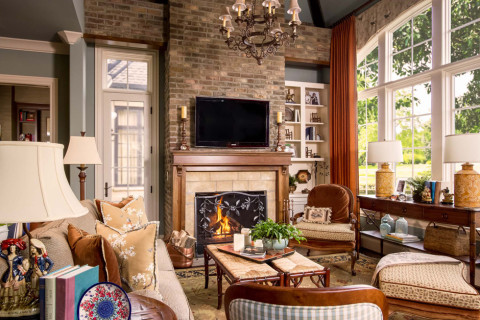
AFTER we simply changed out the light fixture and painted the walls. Simple! oh, and we hung window treatments and furnished this room with cozy upholstery and accessories!
But, how do I determine what must-haves should remain on a client’s list? Well, I do have over 20 years of seeing what changes make a major visual impact and which do not. The lens I look through is one of a completely decorated room, not just removed walls, new tile and new lighting fixtures. Being able to envision a room completed, helps me to know which items are necessary to change and which are not. Many average homeowners lack this ability, so let me give you some examples you might apply to your own remodeling project.
FINISH HARDWARE:
This is one that almost all my interior design clients have on their MUST-HAVE list for a renovation project. I get it, the pitted brass door knobs and hinges are cringe worthy. But, they are more noticeable in an empty room than they will be with a room full of furniture and decorative objects. I’m not saying not to replace the hardware for doors and windows, I’m just saying that’s something you can do later that isn’t terribly disruptive to your life.
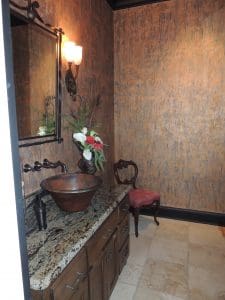
BEFORE this powder bath had an outdated faux finish, but by simply decorating with beautiful wallpaper, we didn’t have to make expensive changes to the cabinetry or sink fixtures.
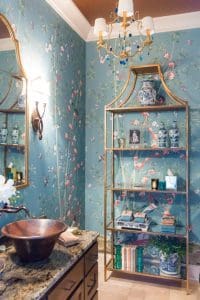
AFTER This dramatic aviary wallpaper was installed this powder bath became a lively showplace rather than dark and dreary.
TRIM DETAILS:
Many times, clients want to remove all the old trim and just redo trim. Larger baseboards and window casings, larger crown molding. Let’s just get rid of it all and start over. I say, hold on a minute. Let’s look at what you have and see if we can add to it rather than remove it all and start over. This is actually a historic detail in many homes. It harkens back to a time where people were much more resistant to go out with the old and in with the new. If your baseboards are too small consider adding a small piece of molding above the existing baseboard. You can leave about 1.5 inches from the top of the base board, install a small new piece of trim and then paint it all out in trim paint. It will look like one large baseboard detail. This also works for door and window casing. I have actually done this in new construction where I want the house was added to over time.
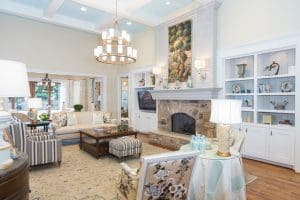
We added trim and painted it all white during this renovation, which included covering a floor to ceiling stone fireplace.
NEW WINDOWS:
I know I’ll get a lot of backlash from this, but new windows are a budget buster. And, with new glass, you lose a lot of the character in old glass. Also, the age that comes from older wood and sashes just can’t be replicated. Before you pitch all that character, and money, look at the cost of storm windows. We just did this at Boxwood Hill, and it saved us a ton of money and saved the look of the old widows and wavy glass.
REMOVING WALLS:
This is a big one that a lot of remodeling clients want to do to their fixer-upper. But, as I just wrote about in the previous blog, this can create more problems than solutions. So, consider enlarging the opening between rooms, but not removing the wall completely. When you open up sightlines among a collection of rooms, the visual effect is the same as if you removed the partition completely. For more on this, check out my previous blog…
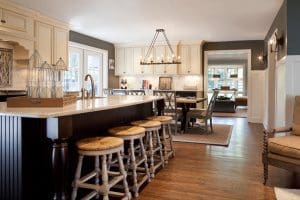
COMPLETE KITCHEN REMODEL:
Now, sometimes this can’t be avoided. But, if the kitchen is 10 years old or less, it can be saved. I have had to talk several clients out of this. Think about if you can cover the cabinetry in a fresh coat of paint. All new plumbing fixtures and cabinet hardware can take a tired kitchen to cover-girl ready in no time. Add in a color of paint on the walls and pretty light fixtures and a window treatment and you can really have a beautiful new look without spending half of your budget on just one room.
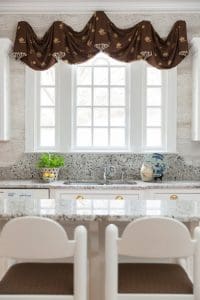
You can apply this scenario to bathrooms as well. Leave all the cabinets and plumbing, just retile and paint, voila: total transformation.
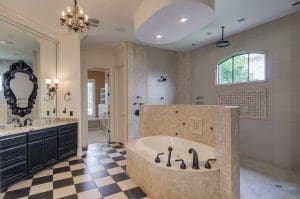
BEFORE this master bath had mirrors galore and the shower resembled a drive thru car wash.
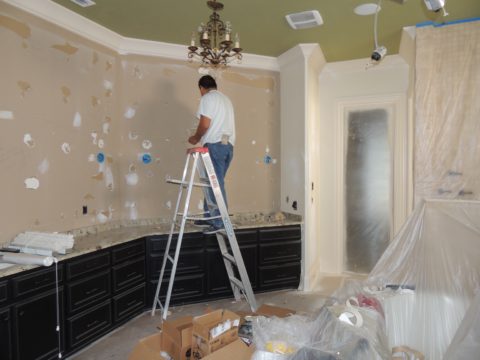
DURING RENOVATION – we removed the mirrored walls behind the vanity mirrors.
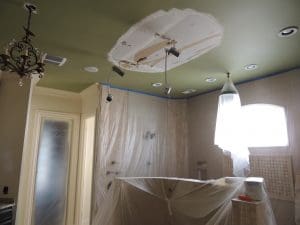
DURING Renovation: We removed unsightly bulkheads, changed lighting fixtures and added glass shower walls.
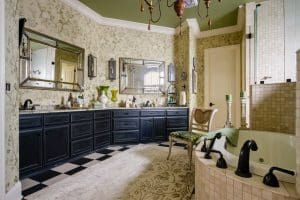
AFTER renovation: With new wallpaper, new lighting, less mirrored walls and fresh accessories this bathroom is a showplace.
These are just a few of how making a few simple changes can make a tremendous difference without breaking the bank. Look around your potential renovation plans and see where you can change simple things that can make a robust effect on the overall look.